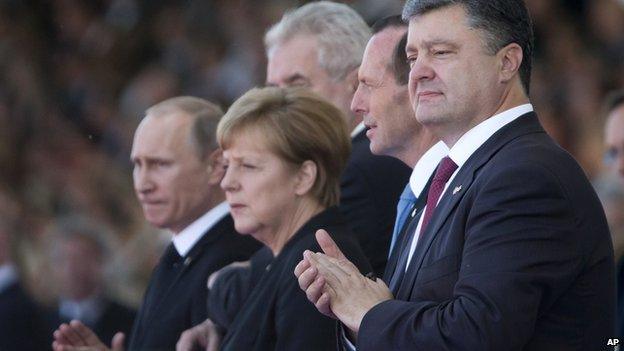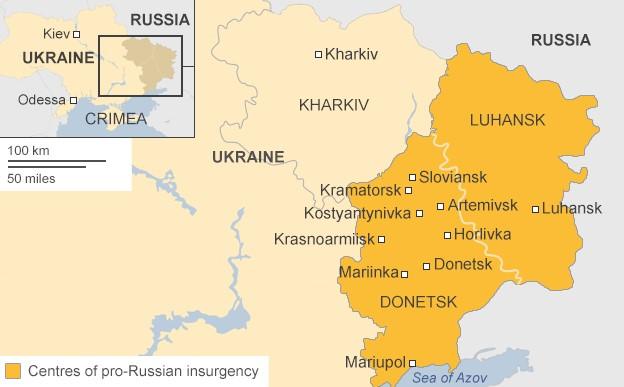Poroshenko, Ukraine's rescuer
- Published
Petro Poroshenko is known in Ukraine as the Chocolate King
Chocolate mogul, government minister, opposition leader - Ukraine's new leader, Petro Poroshenko, has worked in a number of capacities, and has at one point or another been associated with a various political movements, including that of his deposed predecessor, Viktor Yanukovych.
But the role he assumed on Saturday, when he took the oath of office for the presidency, is the most serious so far: rescuer of Ukraine.
Mr Poroshenko has taken the reins of power at perhaps the most critical moment in Ukraine's 23-year post-independence history.
Anti-government protests forced the previous President, Viktor Yanukovych, to flee the country in February. Then, Russia annexed Ukraine's southern region of Crimea.
And now, pro-Moscow insurgents are waging a separatist struggle against government forces in the country's eastern regions.
Besides this, he must steady a teetering economy and restore faith in the country's leadership, since many Ukrainians, especially in the east, view the government with suspicion, or outright hostility.
And last, but definitely not least, Mr Poroshenko must somehow re-establish working relations with Russia - the country's giant neighbour with whom it shares deep cultural, historical, linguistic and economic ties.
With all these considerable challenges in mind, Ukrainians from all regions, as well as a large international audience, listened with heightened attention to Mr Poroshenko's first presidential speech.
There was much in it to please supporters of the February revolution and Ukrainian unity - as was demonstrated by the enthusiastic approval that greeted some of his statements.
"Russia occupied Crimea, which was, is and will be Ukrainian," was one of his top applause lines. "This is what I told [Russian] President [Vladimir] Putin yesterday in Normandy."
And they welcomed his defiant words to the pro-Russian separatists, quoting the Gospel of Matthew - in a slightly different context - that "those who take the sword, shall perish by the sword".
But ultimately, it is not Mr Poroshenko's supporters whom he must convince, but his opponents and those Ukrainians who may be sitting on the fence.
While the separatists steadfastly reject Kiev reasserting its power in the country's east, there are large portions of the population there who might be persuaded to believe that Mr Poroshenko will in fact defend their interests.
Mr Poroshenko has said "all the right words" in his "an attempt to charter a badly needed strategic direction for Ukraine", was the verdict given by Evgen Vorobiov, analyst at the Polish Institute of International Affairs think-tank, external.
EU anathema?

The first meeting between Mr Poroshenko and Mr Putin took place on the sidelines of the D-Day commemorations in France
It is still too early to tell if the new president made a convincing case.
His pledges, made in Russian no less, touched on issues at the heart of the Ukraine's political crisis: more investment in the region, the right to maintain their "own subtleties of historic memory" - shorthand for the east's more positive attitude towards the Soviet period, "free use of Russian in the region" and decentralisation.
But many easterners want an even more autonomous form of governance - federalisation, not decentralisation.
They also insist not on the wider use of Russian, but on establishing it as a second state language. Mr Poroshenko says both of these demands are non-starters.
What is more, he promised to sign a landmark economic agreement with the EU "as soon as possible", saying Ukraine's ultimate goal was to become a full member of the EU.
For many easterners - who desire closer economic and political ties with Russia instead - this could be anathema.
The upcoming days will determine how well, or how badly, Ukraine's separatist regions have taken Mr Poroshenko's first gestures. And it will also be clearer what Moscow's reaction is.
The first meeting between the Ukrainian leader and his Russian counterpart, Vladimir Putin, took place on the sidelines of the D-Day commemorations in France on Friday.
Mr Putin said he "welcomed Mr Poroshenko's position", and on Saturday, he instructed officials to tighten controls on Russia's border with Ukraine to prevent people from crossing illegally.
It remains to be seen if these first steps are something that can be built upon, and whether Mr Poroshenko can preserve the country he has been picked to lead at this decisive moment.
